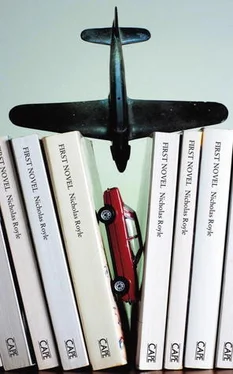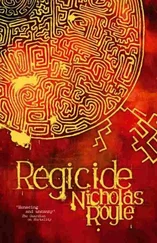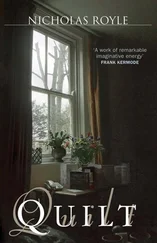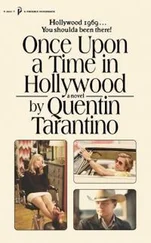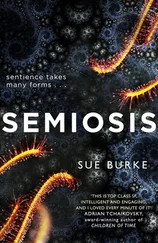‘Shame,’ says Helen, turning to me, ‘you could have read to us from his work.’
There is some kind of inflection in her delivery, but it’s hard to say what it is. A short collective discussion ensues about Lewis Harris and the possible reasons why he has failed to turn up. Soon small groups form and numerous conversations are held at the same time. While chatting to Stephen about his vampire novel I overhear Helen telling someone else she’d tried to check out Harris and get hold of one of his books but had been unable not only to locate any of his titles, but to find any evidence that a writer of that name existed at all.
Later that night I finish The Blindfold . I immediately go back and reread the first page and only then do I realise how clever and sly the author has been.
Thursday morning. I set the group an exercise that requires them to go off and find an object somewhere in the house or garden, or a view that they can photograph, that should inspire a scene in their novel-in-progress. We are to reconvene in half an hour, after they have written as much as they can.
I walk up the lane to the road. By the time I reach the top, my heart is pumping fast and there is a light sheen of sweat clinging to my forehead and the back of my neck. I look one way — the road winds off towards the moors — and then the other. If I started walking to the right I would be in the village in five minutes, and half an hour later I could be down in the town waiting for a train to Manchester. I look at my watch. There are twenty minutes remaining. My scalp prickles. I look down the road. A car approaches slowly. It slows down even further as it reaches the crest of the hill. The driver peers through the windscreen at me. He has a shaved head, a goatee. I swivel and hold the man’s gaze while his car comes alongside and then passes me as he drives on towards the moors. I watch the car become smaller and smaller. It turns a corner and is gone.
I walk slowly back down the lane.
In any case, my car is parked by the house.
Once everyone is reassembled in the dining room, I ask who would like to go first. I look around the group. Helen is playing with her ponytail and sitting back from the table. Stephen is bent over his notebook. Grace has her elbows on the table and is either biting her fingernails or removing dirt from under them with her teeth. Her eyes flick up and lock with mine and she removes her fingers from her mouth. She is about to speak, to volunteer to go first. I look away quickly and see Geeta doing some last-minute editing to the page in front of her.
‘Geeta?’ I say, aware that Grace has raised her hand. ‘Geeta, would you like to go first?’
Geeta hesitates as she looks at Grace, who is saying she wants to read.
‘Geeta, you go first,’ I say.
She collects herself, offers a conciliatory glance in Grace’s direction.
‘It’s very short,’ she says. ‘And a bit rushed.’
‘Please,’ I say. ‘Everyone’s in the same boat.’
Geeta begins to read.
‘The clock had stopped just after 9.15 a.m., just after my mother made a funny little croak. She lay back with her mouth slightly open. I had felt then as if a transparent butterfly or dragonfly had emerged from her throat, hovered for a second, then flew to a place where I could not follow. I felt betrayed that she would die just two months after I had come back. That she would not wait. I was just easing into things, trying to ask her about that time when I was sixteen, when I was abruptly changed into a woman, a woman who immediately sustained a terrible loss. I wanted to ask her why she didn’t say something, why she would let her own flesh go to strangers. I wanted to ask her about the nature of shame and why was it so important to glue our faces together so the cracks won’t show. I wanted to tell her that in Japan, they deliberately made beautiful porcelain with crackled surfaces. I took the clock in my hands and stared into its round face, the long hand just after a quarter past. I wondered at time being stopped for her. For me too.’
There is a hush around the table. Lawrence Duncan — or Duncan Lawrence — breaks the silence.
‘That’s well cool.’
There are murmurs of agreement.
Someone asks Geeta what her object was and someone else says it’s the clock above the fireplace and she nods her agreement at this.
Grace anticipates my asking who wants to read next by raising her arm. The loose sleeve of her hooded top yields to gravity and then it seems as if everyone around the table is staring at the pale flesh of Grace’s inner forearm criss-crossed with red weals. A battle between defiance and embarrassment is fought silently inside that strange, square head. Eventually she lowers her arm and pulls the sleeve back into place. She looks down at the pages on the table in front of her and I am not alone in inspecting the white trails of exposed scalp revealed by her somewhat stringy hair. They remind me of the paths visible in the woodland on the far side of the valley.
Grace starts reading: ‘One occasion the following year, Nicholas and Jonny travelled to Hyde without Liz, who was on call and therefore couldn’t leave London. Nicholas had tried to increase the frequency of their visits. It was important to him to give Jonny a real sense of his adoptive family, a firm grounding in its history.’
Grace glances up and has a quick look around the table before continuing.
As Nicholas and Jonny were arriving, slightly out of breath after the uphill walk from the railway station, a man was just leaving the house. He was short and stocky, thickening around the middle, with dark hair and a silver-white beard. He wore round glasses and a sleeveless, green quilted jacket and carried a bag. He seemed preoccupied and didn’t reply when Nicholas spoke to him. With a distracted air he got into a Renault Espace that was parked outside the house and drove off.
Nicholas rang the bell, but nobody came to the door.
‘Maybe Nana Grandad gone out,’ Jonny said.
‘They don’t go out that much,’ Nicholas said.
‘Why?’
‘I don’t know. I suppose they’re old. It’s difficult. Maybe Grandad’s gone out and Nana’s asleep. Or the other way around.’ Nicholas smiled at Jonny. ‘Let’s go round the back.’
They let themselves in via the kitchen door. The house was quiet. Nicholas could hear a clock ticking in another room. The kitchen smelt as it always did, of lemon curd and Bovril and potted meat and vegetables that were just beginning to turn. He opened a cupboard and found a bottle of orange squash so he could make Jonny a drink. The boy sat at the kitchen table while Nicholas went into the front room, but there was no sign of his grandad, who had perhaps nipped out for supplies, knowing that Nicholas and Jonny were due. There was a line of cards on the mantelpiece. Two weeks previously it had been his nana’s birthday. He picked each card up in turn and read inside. Seeing his own handwriting made him feel self-conscious. He briefly wondered how old she was and worked out that she was eighty-six. He read his grandad’s card, which said ‘To my darling wife, with my love.’ Nicholas swallowed as he stood the card back on the mantelpiece.
He returned to the kitchen, but the plastic cup sat unaccompanied on the table. From upstairs he heard a voice.
‘Daddy?’
‘Yes?’
He started walking into the hall and towards the foot of the stairs.
‘Nana’s asleep.’
‘Well, don’t wake her,’ he said in a loud whisper as he climbed the stairs.
‘She’s sleeping with her mouth open.’ Jonny’s voice grew slightly shrill. ‘She won’t wake up.’
Nicholas climbed the stairs and entered Nana’s bedroom to find Jonny holding her by the shoulder and shaking her. He grabbed Jonny’s arm and pulled him back, roughly, too roughly. The boy started crying. Nana lay on her back, her bottom jaw hanging open. She looked small, doll-like. Jonny was still crying. Nicholas reached out and gathered him into a fierce embrace.
Читать дальше
